What Seattle police said in their exit interviews. (It's blistering)
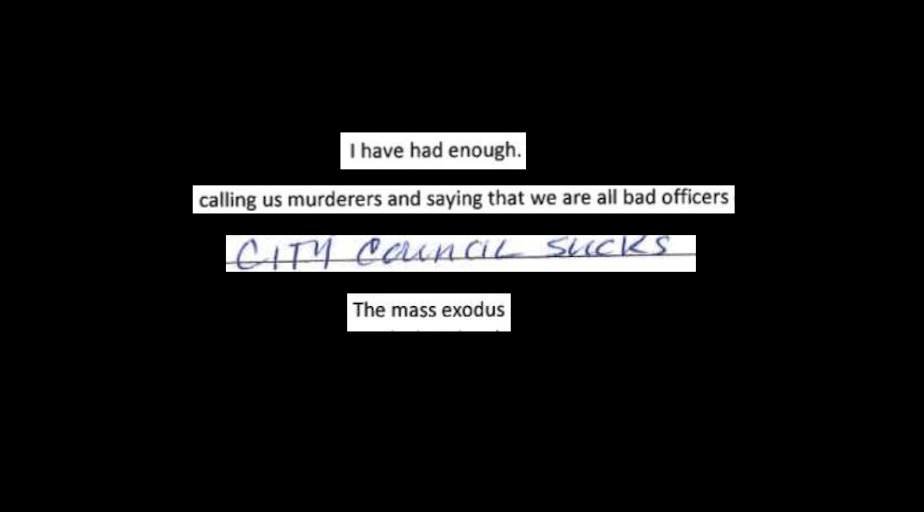
"Hyper-aggressive oversight." "Non-supportive city government." "No backing from city, OPA and community." "An increasingly spineless legal system." These are the parting shots of Seattle police officers explaining why they left in the past year.
In dozens of unredacted exit interviews over the past year, departing Seattle police officers provided their agency with their blunt take on the political climate in Seattle, including the statement, “City Council sucks.” Another officer observed of the Police Department, “everybody seems unhappy.”
But many officers praised their leadership and the training, opportunities and relationships they formed within the department. Some said they’d gladly return to SPD “if the city can right itself.”
One said, “The amount of training we receive here is no doubt the best in the country.” Another answered that "coffee" was the biggest factor helping morale.
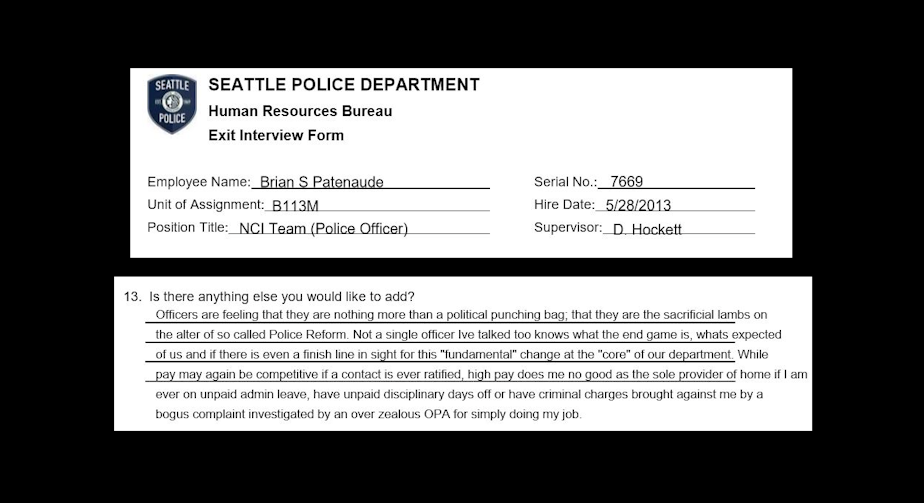
Eighteen officers said they left SPD to join neighboring law enforcement agencies, including the King County Sheriff’s Office, as well as police departments in Tacoma, Renton, Kent and Puyallup. Another 11 officers were retiring.
Sponsored
In their interviews, obtained through a public records request, many officers blamed their departures on rhetoric from the Seattle City Council, city politics in general, and what they viewed as biased media, and an overzealous Office of Police Accountability. Some also cited a hostile public.
Officer Marty Malone, who left Seattle police for the King County Sheriff’s Office, said, “It is hard sometimes to stay positive when some days it feels like some people of Seattle don’t want you there.”
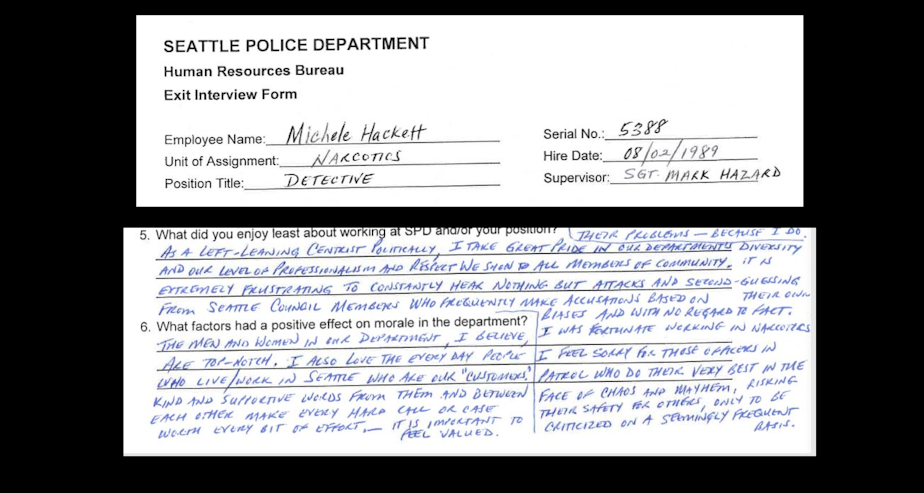
Officers also mentioned the lack of a labor contract, which meant four years without a raise, and understaffing, two issues city officials have tried to address with the passage of the police contract and new hiring bonuses for experienced officers.
One officer wrote, “I hope this department will develop a plan to retain its younger officers who are leaving at an alarming rate. This is a current embarrassment to the city.”
Sponsored
Another called the passage of the contract last November an important step, saying, “I noticed that once the union contract was signed, morale in the department improved.”
Three officers said Seattle City Councilmember Kshama Sawant’s statements about the police officers who shot Che Taylor in 2016 made them glad to work elsewhere.
Officer Malone wrote, “Our own City Council calls officers ‘murders’ [sic] without listening to all the facts.” At the time, Sawant denounced what she called Taylor’s “brutal murder” by police. The officers involved later sued Sawant for defamation and have appealed the dismissal of the lawsuit.
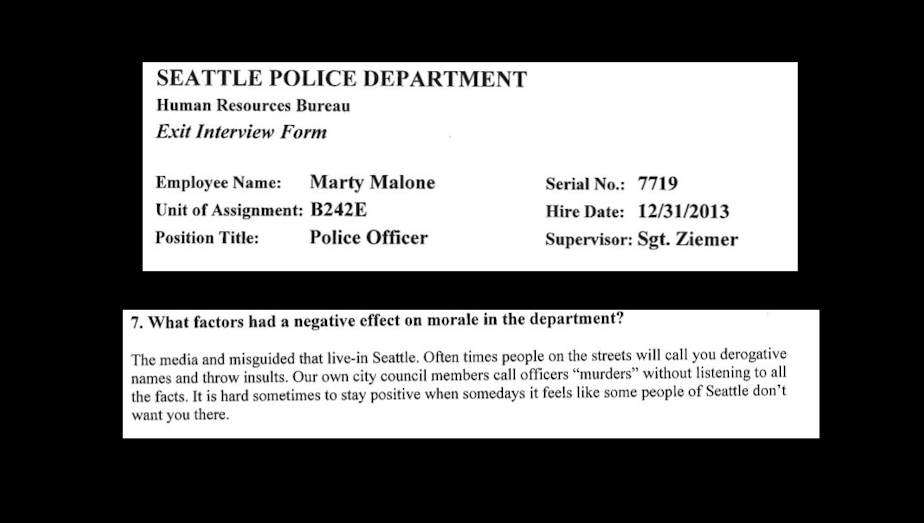
In a statement to KUOW in response to these exit interviews, Sawant pushed back hard, here is her full response: “African-American community members are overwhelmingly disproportionately targeted in fatal police shootings, arrests, and mass incarceration. Seattle police shoot and kill more people each year than the police forces of many countries. The city’s political establishment unfortunately approved a police contract last year that rolls back the hard-won accountability measures, with only my dissenting vote. We need a democratically-elected community oversight board in Seattle, with full powers to hold police accountable, including setting department policy and procedure.”
Sponsored
Detective Michele Hackett retired after working 29 years including in narcotics.“I am a true SPD loyalist,” she wrote. “I love our department and the people I work with.”
She also liked the public, she said. “I love the everyday people who live/work in Seattle who are our ‘customers.’ Kind and supportive words from them…make every hard call or case worth every bit of effort. It is important to feel valued.”
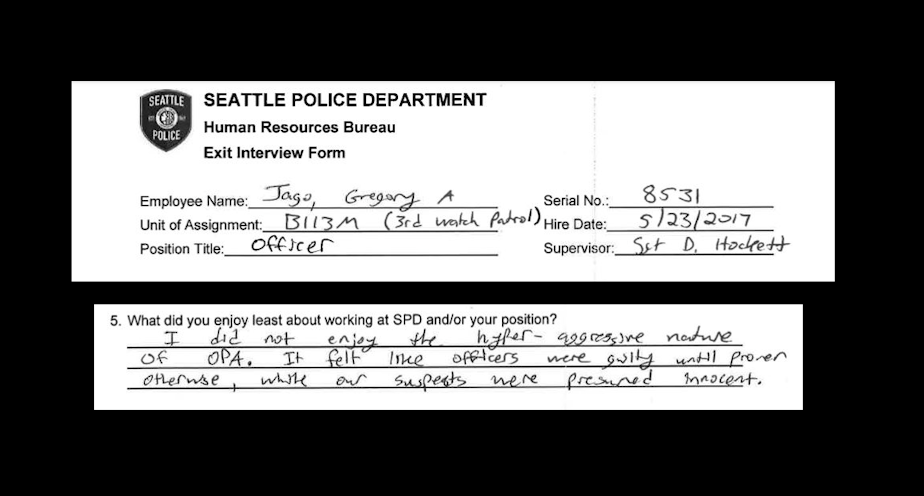
Hackett was one of many who voiced frustration with the Seattle City Council.
Sponsored
“As a left-leaning centrist politically, I take great pride in our department’s diversity and our level of professionalism and respect we show all members of the community," she wrote. "It is extremely frustrating to constantly hear nothing but attacks and second-guessing from Seattle council members who frequently make accusations based on their own biases and with no regard to fact."
Hackett said she felt sorry for her colleagues in patrol "who do their very best in the face of chaos and mayhem, risking their safety for others, only to be criticized on a seemingly frequent basis.”
And many said the Office of Police Accountability, which investigates officer misconduct, is hindering their work and damaging their morale.
“It seems like everything an officer does is scrutinized for any and all violations – such as no name tag or failure to activate something," Hackett said. "We are human doing the best job we can. It seems like we are no longer afforded any benefit of the doubt.”
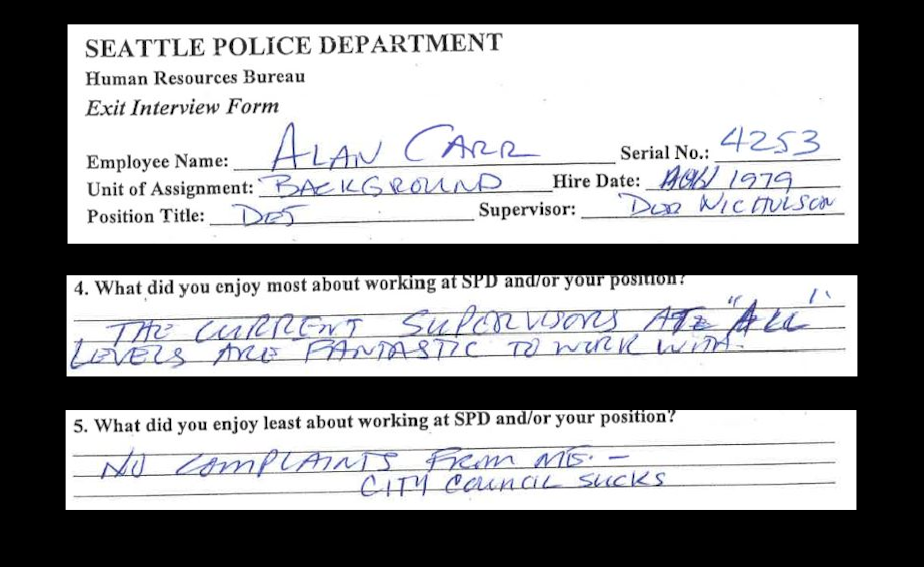
Sponsored
Officer Gregory Jago left Seattle for the Kent Police Department.
“I did not enjoy the hyper-aggressive nature of (Office of Police Accountability)," Jago wrote. "It felt like officers were guilty until proven otherwise, while our suspects were presumed innocent.”
OPA director Andrew Myerberg said reports to his office have increased, and he understands why officers are frustrated. He said he's working on policy changes that would allow managers to deal with smaller issues rather than putting an officer through a lengthy investigation.
“I think the officers have a fair criticism,” Myerberg said. “One thing we’ve really been working on at OPA especially over the past year is how to re-empower supervisors to take back minor misconduct — but if they’re going to do so, to do it correctly and maintain accountability and transparency over the process.”
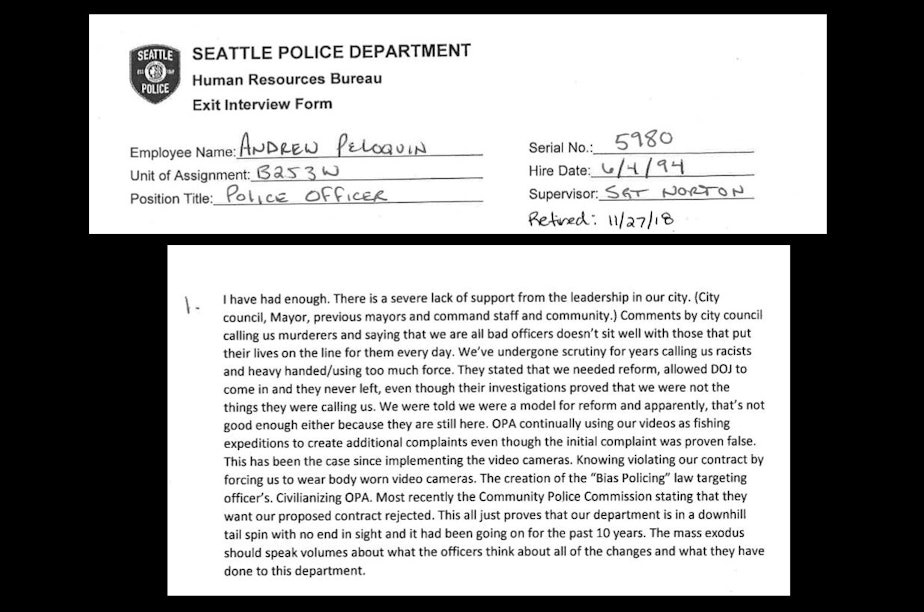
If someone alleges serious misconduct, such as improper use of force or biased policing, Myerberg said his office is required to investigate.
“We’re constantly are trying to walk that line and balance that out," he said. "To address allegations of misconduct but obviously when there’s nothing that can be proved or when it’s unfounded on its face, to deal with those appropriately” while ensuring public trust.
Brian Patenaude said he was leaving to join the Tacoma Police Department because of a “lack of support from the city.” He said that included “being told to not enforce certain laws (local and federal). The lack of cases being filed on crimes that matter to the community. Catering to drug abusers and the homeless.”
Patenaude suggested that Seattle Police eliminate the need to report a “use of force” if someone complains of pain or discomfort while being handcuffed. “Handcuffs are not designed for comfort,” he said. “Most arrestees have abscesses on their wrists from injecting illegal drugs.” Multiple SPD officers said the requirement to document any pain on the part of someone being handcuffed is overly bureaucratic and can delay the arrest.
SPD Chief Carmen Best said in an interview they have revised the policy recently to make it easier to follow. “If the person has any pain in handcuffing we’ll document that pain so we can track all of it,” she said. “We made that process a lot more streamlined for officers so they can annotate it, because we don’t want to lose the information. But there’s not the same level of paperwork that was required previously.”
Officer Malone said he believed the King County Sheriff’s office would make him feel more supported, and allow officers “to give their all to the job.” “I think the extreme scrutiny that officers face in Seattle is unjust and misplaced,” he said. “I often see amazing officers being punished for doing their job…making them lose the desire to be proactive. Officers are in career-preservation mode and with it comes a diminished level of crime prevention. I dislike being told to do less, and to only handle routine calls for service.”
Malone added, "One day I hope the city can right itself, like a ship with a great crew, but for now all I see is a ship floundering in the sea. The leadership at this department is second to none, and I know they see the trend of officers leaving the department. Something is bound to give….sadly that feels like it’s in the distant future.”
You can read more of these exit interviews below or click here.




